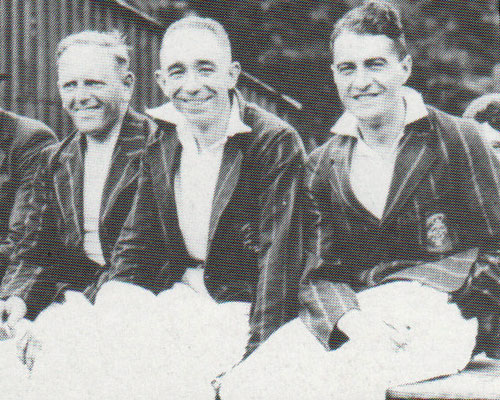
- Born 25 January 1902, Rutland Street, Belfast
- Died December 1981, Belfast
- Educated Ormeau Park School, Belfast
- Occupation Professional Footballer later Manager
- Debut 24 July 1930 v Sir Julien Cahn's XI at Ormeau.
- Cap Number 374
- Style Right-hand batsman; right arm fast medium.
- Teams Lisburn, Ulster CC, Woodvale.
Billy McCleery, though he won wider fame as a footballer, was a very good cricketer, who would surely have played more times for Ireland but for his involvement with the winter game. Small in stature with prematurely balding dark hair, he was an all rounder. A stylish free scoring upper order batsman, he was also a lively fast medium bowler. When he was at the height of his footballing career, large crowds flocked to his cricket matches, just to see him play.
Billy has a special place in NCU History. Not only did he take part in 14 Challenge Cup Finals, winning nine of them, but he did so for three different clubs. Further he was often one of the key players in the game. Had a "Man of the Match" award then been in vogue, his trophy cabinet would have been even fuller of medals than it was.
He won a medal with Lisburn against North Down in 1929, before moving to Ulster the following season to find himself once more pitted against Willie Andrews' men an the Final. He made a first innings 71, top score out of a moderate 169, and then took 5-30 to give Ulster a decisive lead. The following year he again bowled well, but, in the words of North Down historian Ian Shields, "this time the gritty McCleery was upstaged." The MacDonald brothers ensured a Comber triumph. By 1933 he was at Woodvale, which attracted large Linfield support! A further medal followed, but in 1934, the Ballygomartin Road side were heavily defeated by the men from The Green, though Billy and fellow paceman Charlie Billingsley both took 6 wickets in an innings.
Billy was again to the fore in Woodvale's victory over Cliftonville in 1938, a stylish 50 ensuring success in a second innings run chase. During the war years, the Finals were played as single innings affairs, Billy bowling Muckamore out for 53 in 1941, to give his side a 135 run victory. Between 1948 and 1950, he led Woodvale to three successive Cups. His captaincy was much admired, and, in the first year, his second innings 30 saw his side home by 3 wickets, despite hostile bowling from CPA paceman Tom Newburn. He played again in a winning team, aged 50, in 1952, thus concluding a remarkable Cup Final career. During his time with Woodvale, they also won the League three times.
Billy's one match for Ireland was at Ormeau in July 1930 against Sir Julien Cahn's XI. Cahn was a millionaire cricket enthusiast who ran his own side for over 10 years between the Wars. No doubt today (2008), he would be more at home in India. Cahn played in the match, as he usually did. He generally contrived to stay out of the way of the ball, but wore fielding pads in case of mishaps. His wants on the field were attended to, not by the 12th man, but by his butler.
The Irish side for this match was designed to attract a big crowd to Ormeau, the captain AP Kelly, being the only Dublin based player, though NICC opener Bill Loughery had just finished 4 years in the Dublin University XI. They were shot out for 90, Billy making 10 at No 3. His was one of six wickets to fall to leg spinner Tom Richmond, who was one of Cahn's professionals. Tom played 245 times for Nottinghamshire and also had one Test for England in the disastrous summer of 1921, when, in what sounds a depressingly familiar manner, the Australians crushed England by pace and leg spin. Tom took two good wickets in his only outing but the series is perhaps best remembered by the sight of the Australian captain, Warwick Armstrong, picking up a newspaper, as it blew across the Oval, and reading it. When asked why, hr replied, "I wanted to see who we were playing!"
 Three of Woodvale's finest - Bob Harrison, Billy McCleery and Charlie Billingsley
Three of Woodvale's finest - Bob Harrison, Billy McCleery and Charlie Billingsley
Back to Ormeau: Cahn's XI scored 269 in reply. Billy opened the bowling but took a middle order wicket, that of amateur batsman Fred Newman. Fred was a fair cricketer but was in the XI as the knight's private secretary and cricket organiser. Ireland collapsed again in their second knock, Billy getting a duck. Cahn, who liked to win, did so by 10 wickets.
As a footballer, Billy was a half back who began with Cliftonville and Queen's Island; the latter gave him a wage of £2 and a job in the shipyards. He gained an amateur cap against Norway and in 1925 was signed for Blackburn Rovers, having impressed them while guesting for Linfield in a friendly. He held a first team place for three seasons before injury forced him out. A brief stay with Dublin side Shelbourne followed, during which it was feared that all his old skills had deserted him. However he then signed for Linfield, who paid his Woodvale subscription to help persuade him. All his former aptitudes returned, as, mirroring his cricket activities he helped them to 4 League Titles and 4 Cups. He also won 9 (Northern) Irish caps.
He retired in 1936, but became Manager in April 1939. This proved a short lived appointment as he resigned the following season, War work, selection disputes, and a desire to concentrate on cricket being contributory factors. However he had one footballing triumph remaining, perhaps his greatest. On 25 April 1956, he managed the Irish League side which defeated the Football League 5-2 at Windsor Park.
